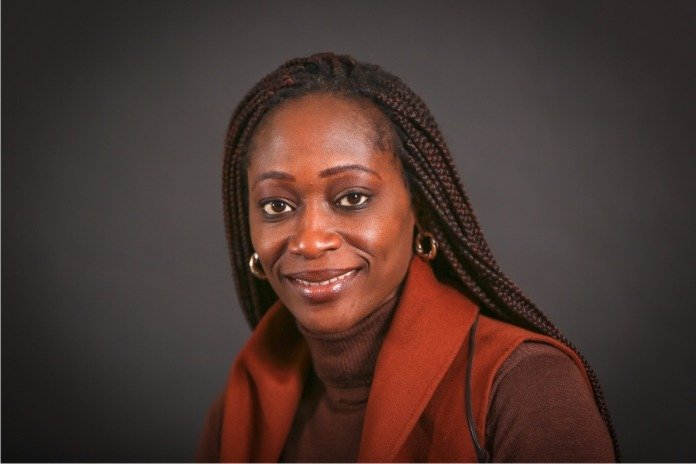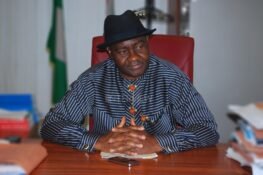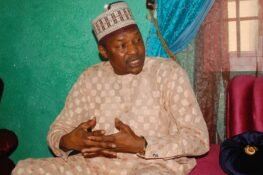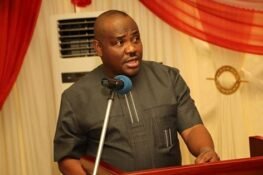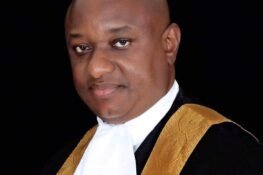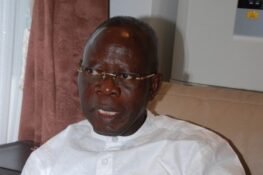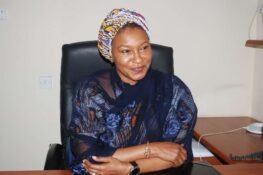In this deep and wide-ranging interview, the daughter of the winner of the June 12 election and newly appointed executive president of Women in Africa, Hafsat Abiola-Costello, provides rare insights into how the struggle for the actualization of her father’s mandate affected the family.
What does your appointment as Executive President of Women in Africa (WIA) Initiative mean to you?
My appointment as Executive President of Women in Africa is the perfect opportunity for me to work on the empowerment of women in Africa. It’s a dream job because I believe that the women of Africa can change the fortunes of the continent and with this appointment, I have the perfect platform to make it happen.
The news of your appointment had not died down when the Federal Government awarded your father GCFR, declared that June 12 would be the new Democracy Day and apologised to your family for how your father was treated. How did you receive the news?
When I heard the news, I felt that I had been catapulted into another world. It restored my faith in my country and in the idea that serving others is the best way to live one’s life.
During the acceptance speech, your brother, Kola, was called up but he invited you to give the speech and wrapped it up. Was there a message the family was trying to send?
I do not know for certain, but it is my hope that the message we were trying to send is that we will work on being united as we go forward.
In your speech you also apologised to the Federal Government in response to Buhari’s apology to your family. What did you apologise for?
I apologized for my father’s purported support of the IBB coup that brouight an end to General Buhari’s administration.
In your first statement after the GCFR was awarded to your father, you titled your article, “25 years after June 12: Our long wait for justice is ending.” At what point do you think justice will be fully served?
When Nigeria’s democracy is functioning in a way that justifies the sacrifices of those that fought to ensure that we would have this chance.
Again, in that statement you said at some point it was clear that the goal was to erase the name of the man whose sacrifice paved the way for democracy. That has been interpreted in some circles as throwing a shade at former President Olusegun Obasanjo. Is that right?
I have always been mystified by General Obasanjo’s inability to honour my father as President Buhari has now done. It is was not his finest moment but I must confess that I’m glad that if he didn’t want to honour my father, he didn’t do it. My father’s sacrifice was such that it should not be belittled by honour grudgingly accorded. The intervening years wereas painful for my family but listening to President Buhari’s speech on June 12 and hearing the sincerity behind his words was worth waiting 25 years.
What do you say to people who say that Buhari’s GCFR award to your father was a bribe for the Southwest vote in 2019?
I feel President Buhari’s actions were sincere but for the sake of argument, would it be wrong for the President to do something that Nigerians wanted? Isn’t that what we want of our leaders? I would say let him continue to ‘bribe’ us with policies and actions that demonstrate that he is listening to the people of our country.
Your brother, Kola, told Channels TV how he tried in vain to get former Presidents Yar’Adua and Jonathan to honour your father, but nothing happened. Did you know of these futile attempts?
Not of Brother Kola’s efforts but I did know of those of others like Ogbeni Aregbesola who tried to convince President Jonathan.
Sometime in 2010/11, President Buhari visited your father’s grave in Abeokuta in the company of Pastor Tunde Bakare. Did Buhari make any promises on that occasion?
No, he simply prayed for my father.
Did you – or any member of the family – reach out to him after that visit?
One of my brothers was a member of President Buhari’s earlier political party, CNPP. He used to visit him and help with his campaigns when he came to Lagos and Ogun State.
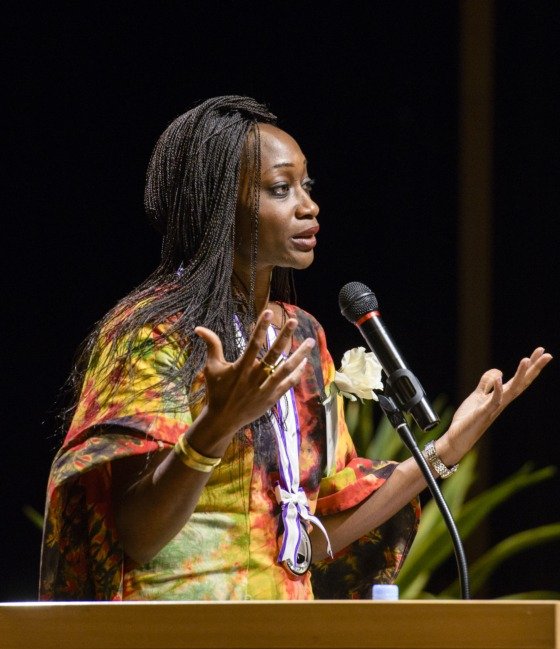
On June 30, 2012 the prime suspects behind the gruesome murder of your mum, Kudirat Abiola, Hamza Al-Mustapha and Alhaji Lateef Shofolahan were sentenced to be hanged. However, they were later released on appeal by a court in Lagos. How did you feel when they were released?
I don’t believe in the death penalty. However, I can’t understand how people who are clearly guilty of murder are simply declared innocent of the charges in spite of the evidence against them. It would be one thing if people that are sentenced are pardoned and it’s quite another when they are simply said to have no case to answer. If they have no case to answer, how did my mother die? Did she commit suicide? It’s not good for our country that we simply fail to hold people accountable for their actions at every turn. In the face of such brazen impunity, how can we expect people, by and large, to follow the rules? We would simply be laying the foundation for opportunism, a society governed by force and not by laws, and violence.
Your father was in detention when your mother was assassinated by state actors. How did you receive the news of your mother’s assassination?
My half sister called to tell me.
Do you recall any premonition on that day that something so horrible could possibly happen?
No, I did not. I did not realize that she was in such danger, that the military government would do something so brutal. It was simply one more sign that our government was there to serve itself and not the people.
Share with us your last conversation with your mother?
My mother was preparing to come for my graduation from university in the U.S. But during our conversation, she was telling me about how she was bringing tapes of her activism, of demonstrations that she had led and interviews that she had given. She then said, “Hafsat, you would be so proud of your mummy.” Her saying that made me wonder if she thought my siblings and I hadn’t been proud of her when she was simply a house wife or when she was building her modest business in the shadow of her hyper successful husband. So, fearing that she was living under his misconception, I said to her, “Mummy, I have always been proud of you.” That was my last conversation with her. She was killed two days after.
What are some of the enduring lessons you have learnt from your mother?
I learned that kindness and compassion are languages in which I should strive to be fluent, and yet that I should not allow people to use my facility with theose languages to turn me into a pushover.
Do you think that the tragic deaths of your father and mother at a time when you and your siblings were relatively young might have affected you in any significant way?
Definitely, it affected us. It affects us still. But the good side of it is that the pain and the difficulties humanized us. Up until June 12, we were on the highway of life, oblivious to the reality of majority of people. After June 12 and especially after our parents’ deaths, we found ourselves on the service lane, going much slower but better able to see and understand what reality looks like for the majority of people.

Are you aware how the news (of your mother’s death) was passed on to your father at the time and what his response was?
I believe he was told by his doctor and that it shocked him.
Did you ever visit your father throughout the period when he was in detention?
Yes, we were allowed to see him once.
What’s it like to come from a very large family like yours?
It’s a gift and it’s a challenge. When I was growing up, I always had my siblings that were around my age as my playmates. Now, I strive to replicate that communal way of raising children for my own two children by bringing them to Nigeria as often as possible so that they spend their waking moments in the company of their cousins, all of them playing together and learning how to share and to get along. But it is also a challenge in the sense that the larger the family, the more complicated it can be to forge a sense of unity. However, it can be done; all that is required is the will to do it. If our family can do this, then I sincerely believe that more than money, our relationship will be the best legacy that our father gave us.
You have spoken of how your father rehearsed his inauguration speech that was not to be. What kind of president do you think he would have been?
I think his greatest achievement as President would have been to start Nigeria on a journey to economic diversification. His strength was his business acumen and networks. Our biggest challenge in Nigeria is the need to have an economy that can offer opportunities to our large population. It is tragic that we are still struggling with this issue. Had he served, it is unlikely that Nigeria would be where it is today.
There were insinuations that your father’s death, in detention, was not from natural causes. Did the family try to independently verify how and what he died of?
An autopsy was conducted that did not find anything suspicious but considering the fact that not all poisons can be traced, I feel that their report is not conclusive.
Your father’s businesses haves suffered greatly and sometimes the children get criticised for not doing enough to keep the businesses alive. Do you think the criticisms are unfair?
The truth is that outside of Brother Kola and his siblings, the rest of the children do not have access to our father’s businesses, in spite of my father’s stated intentions in his will. It was only in the last two years that Abdul Mumuni took over Concord and is trying to put the property to good use. I hope that the issues surrounding the execution of my father’s will will can be resolved soon.
Your father had a pan-Nigerian mandate. One of the biggest problems that Nigeria has been facing for sometime now is deep religious and ethnic divisions.
What has changed?
The annulment was a missed opportunity. Since that time, the country has become even more divided than it ever was. I hope that with the recognition and revalidation of the June 12 election, we can begin to kindle the spirit of unity in the country for a second time.
The award of GCON to Babagana Kingibe has been widely criticised on the ground that he abandoned the mandate. But he said in an interview with The News magazine at the time that your father was no longer taking him into confidence. What do you think happened?
Perhaps my father didn’t trust him (Kingibe). Perhaps events were moving so quickly that it was difficult to maintain an effective, open line of communication. Perhaps their relationship was too superficial to withstand the pressures and intrigues that came with the annulment. Who knows? Nigeria’s political system is often an aggregation of interests, most of them short-term in horizon. They are not conducive to building a movement, waging a struggle that could take years, as the June 12 struggle required. Those that came together into the political parties hadn’t anticipated an annulment and when the annulment became their reality, they all had to assess their options. The majority of politicians chose to support the military junta and moved on. My father’s running mate wasn’t alone in making that choice. Interestingly, Nigeria’s democratic political system continues to be largely an aggregation of interests. And it continues to lend itself to brittle alliances that cannot withstand the pressures of political debate and the contestation of interests. The politicians may wish to represent a range of issues but so fragile and unstable are the alliances that they end up coming together on the lowest common denominator, often their short-term self-interest. If we are sincere about driving a development agenda, it will be essential to come up with a solution to this. Once we get past the personalities involved, we can see that the need to develop stable political alliances would facilitate long term development planning, which is what our country needs.
Are you planning to join partisan politics any time soon?
The NGO that I founded to honour my mother, the Kudirat Initiative for Democracy, KIND, has been working on supporting women who want to run for office. I have also had the privilege of serving in two cabinet positions over the last 7 years in the Amosun administration in Ogun State. Women must get involved in partisan politics. I certainly hope to do so.
How would you rate the performance of the Buhari administration on its key promises to fight corruption, create jobs and on security?
I think the administration has fallen short of its promises, probably because the problems are more complicated than they had expected coming in and because the dynamics between the executive, legislature and judiciary have not been seamless. Likely, if it is elected to a second term, it should be able to do better, having used this first four years to develop a good understanding and some capacity for driving the system to deliver results.
On UN’s list, Rwanda was ranked first among countries with most women in parliament in the world as at January 2017, Senegal, South Africa, Uganda, Zambia and Mauritania, ranked 7, 9, 12, 13, 17, and 19 respectively, while Nigeria ranked 180 out of 190 countries, how does WAI hope to promote more women in governance in Africa?
WiA Women in Africa is working to promote women leaders and to mentor high potential women to run for office and lobby for appointive positions. In May, we worked with the Louis Vuitton Foundation to hold an event for the new First Lady of Angola, Ana Dias Afonso Lourenço; and in June, we collaborated with Lazard to hold an event where Dr. Ngozi Okonjo-Iweala presented her book, Fighting Corruption is Dangerous. We will be doing several more events to raise the profile of Africa’s women change agents, to inspire others to follow in their footsteps; and are developing tools to facilitate mentoring between established and high potential women.
The Nigerian writer Chimamanda Adichie has drawn some criticisms lately about her comments on feminism, first about Hilary Clinton describing herself has “wife” in her profile; and also, about men opening car doors for women. Do you think Chimamanda has a point?
I think that many women that go into politics do so because they want to make an impact. However, in order to secure popular support, they also tone down their message to conform to society’s expectations. Since women politicians are public figures, people, women especially, have the right to discuss the choices they make in the process of marketing themselves to make sure that these branding efforts do not so dilute the female politician that all her unique attributes that would make her a great change agent is lost.
What is your experience so far in an inter-racial marriage?
So, when I got married, I had already been immersed in a western culture for at least a decade and a half, having left for the U.S. to complete my high school at the age of 15. I thought I already had a pretty good understanding of western people but I discovered after I got married that there was still a lot to learn. By and large, I think I have been lucky. My husband is a great father to our children and is family-orientated. He is progressive in outlook – happy to do his share of housework and more than his share of raising the kids, considering that for years I’ve been working in Nigeria while he and the children are living in Belgium. He should get an award!
Where will Women in Africa be in the next four or five years?
I hope WiA will be a household name across all of Africa’s 54 countries and will be leading the charge in preparing the continent’s women to turn our challenges into opportunities for personal and collective advancement.
